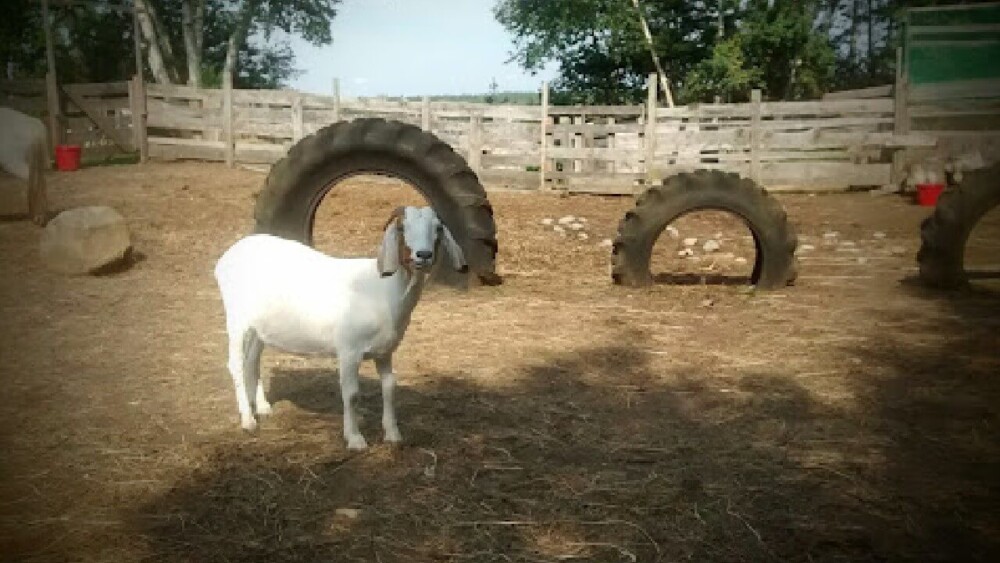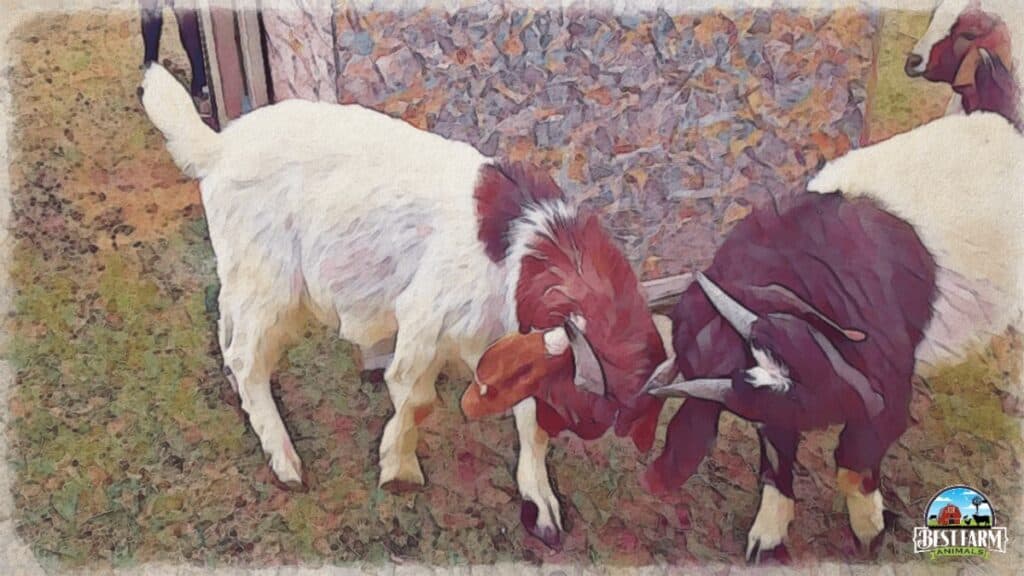Teaching your goat not to headbutt is crucial but often overlooked. Goats headbutt for many reasons.
This can cause issues because goats that headbutt can cause serious injury, especially if you aren’t expecting a headbutt, or if they headbutt a child.
My neighbor was headbutted by a young buck, which injured his knee because he wasn’t braced for it or expecting it. (Fortunately, he was okay and made a full recovery.)
We’ve raised all but two of our goats from kids. We’ve never had any of them headbutt us because while you can’t control every goat (there are always exceptions) you can train most goats not to headbutt people.
Table of Contents
- 1. Don’t Touch Your Goat’s Head
- 2. Do Not Allow Pushing
- 3. Early Handling To Properly Socialize Goats
- 4. Integrate New Goats To The Herd Gradually
- 5. Assert Leadership In The Goat Heiarchy
- 6. Separate Bucks or Consider Castration
- 7. Provide Ample Space and Stimulation
- 8. Understand Goat Body Language
- What Goats Are More Likely to Headbutt?
1. Don’t Touch Your Goat’s Head
Many people gravitate toward scratching or rubbing the top of their goat’s heads in the horn area. This is a surefire way to encourage headbutting, even if your goat doesn’t have horns.
Instead, scratch under the chin, sides of cheeks, or the neck.
Similarly, avoid grabbing your goat by the horns. Most goats will resist this, and it could lead to headbutting. Train goats to walk on a collar instead.
2. Do Not Allow Pushing
Kids will push against your leg or hand, usually playfully, but also to test boundaries.
This may be cute with a baby goat, but it won’t be when the kid grows into a 100-200 lb adult.
Instead of allowing it or pushing back, react by immediately moving away, paired with a firm “No!” Make sure your goat doesn’t think it’s a game.
If it continues a third time, use a spray bottle filled with water.
3. Early Handling To Properly Socialize Goats
Early handling promotes friendliness later in life, so handle the kid with future behaviors in mind. Be mindful of what behaviors you’re even inadvertently rewarding.
Never engage or reward behaviors that you’ll regret encouraging later.
Handle kids with affection, and ensure they’re comfortable with human contact. Ideally, they should see you as a protective leader and run to you as soon as they spot you.
It’s important to realize that owners must balance love and training; one without the other won’t work. I’ve seen several beginners think that showering the animal with love will cancel out bad behaviors. They don’t consider proper training.
Sadly, it turns into a rude awakening when their beloved goat begins headbutting them.

4. Integrate New Goats To The Herd Gradually
It’s tempting to bring home a new goat and immediately introduce her to the herd, hoping they’ll become fast friends. Unfortunately, this doesn’t often happen.
Instead, it can result in injury as the goats are forced into determining the new hierarchy.
Integrate any new member to the herd gradually with an adjacent pen, and observe how they behave. Keep sessions short and increase them progressively over time.
Give the herd and new goat time to adapt to each other, even if the “herd” only consists of no more than one or two other goats. It’s a good idea to keep new goats separate for health reasons also.
This is especially important with young, ill, or pregnant animals. It also applies to other animals, such as Livestock Guardian Dogs, who are usually raised with their charges from pups.
Always keep the new animal separate for a time. This prevents any squabbles that could arise, not to mention diseases, and it’s an easy solution.
Plus, keeping goats separated for a few weeks can help curb any infections the new goat may have.
5. Assert Leadership In The Goat Heiarchy
Goats are herd animals with a hierarchy. Leadership means mutual respect, not domination. Always maintain cool, calm confidence.
How do you know your goats respect you? Well, when my goats are startled, they all come running to us to hide behind us for protection and comfort.
I think that’s a clear indication of who they look to for support.

6. Separate Bucks or Consider Castration
Keep bucks separate from the rest of the herd, except for breeding. You can keep a wether and a buck or two bucks together.
Don’t keep does and bucks together but never keep any goat alone. Bucks can cause damage to pregnant does, potentially causing a miscarriage, in addition to unwanted pregnancies.
If you do not need a buck, consider getting wethers or castrating your young males.
Castrated males are often more friendly and easy to handle than bucks.

7. Provide Ample Space and Stimulation
Goats require space to run and play. Imagine if a herd of goats is crammed into a small space, and one is getting excessively picked on. It would be challenging or potentially impossible for that goat to hide from the others.
Scattering your herd out on a field will significantly reduce the chance of one goat getting headbutted to the point of injury.
Mentally engaged goats are also less likely to headbutt.
It’s a great idea to keep fascinating stimuli throughout the pen. We have tires embedded in the ground, which they climb on and use as oversized scratching posts. Some other ideas include large rocks, climbing structures, wooden wire spools, etc.

8. Understand Goat Body Language
Sometimes goats give indications that they’d rather be alone. Ignoring these signs and insisting on your company can lead to headbutting. Always give your goats the choice of whether or not to hang around you.
Don’t force them.
If a goat raises his hackles, stomps at the ground, walks away, makes loud vocalizations, or shows other signs of stress or discomfort, it’s best to move away.
Some people think this passes dominance to the goat, but it actually establishes the goat’s respect for you.
So, learn to be mindful around your goats and to read the signs they’re giving. Remember, these indications are the only method of communication goats have.
What if my goat won’t stop headbutting?
Sometimes goat owners must make a difficult decision in the case of a perpetually aggressive goat. You may have to rehome the goat when all other measures have been taken.
But, let the new owners know about the problem.
What Goats Are More Likely to Headbutt?
All breeds, ages, and sexes of goats can headbutt. That said, bucks and a few breeds of goats are more well-known for this behavior.
Bucks are more likely to headbutt during the breeding season to demonstrate dominance. This is when they’re rutting and surging with testosterone, making them extra pugnacious.
Not all bucks are aggressive, but they have a greater probability of it than wethers and does.
A few breeds are known for headbutting, such as Kalahari Red, Madurai, Spanish, and sometimes Boer.
Some goat breeds (like the Madurai) have been bred specifically for fighting, so aggression, in this case, becomes genetic.
Headbutting Goats FAQ
Why do goats headbutt people?
Goats headbutt people for various reasons, but primarily as a form of communication and establishing dominance within their social hierarchy. It can also be a playful or curious behavior, or even a sign of frustration or discomfort.
Is it dangerous when goats headbutt people?
While goats are not typically aggressive animals, their headbutting can be forceful and potentially cause injury, especially if the goat is large or feels threatened. It’s essential to be cautious and respectful when interacting with goats to minimize the risk of injury.
How can I avoid getting headbutted by a goat?
To avoid being headbutted by a goat, it’s crucial to respect their personal space and boundaries. Avoid sudden movements, loud noises, or behaviors that might agitate them. Always approach goats calmly and gently, allowing them to get to know you at their pace.
Can training or socializing goats prevent headbutting?
Socializing and training goats from a young age can help them become more accustomed to human interaction and less likely to headbutt. Positive reinforcement techniques can be used to teach them proper behavior and boundaries.
What should I do if a goat starts headbutting me?
If a goat starts headbutting you, try to remain calm and avoid reacting aggressively. Move away from the goat slowly and maintain a safe distance. Never hit or yell at the goat, as this can escalate the situation.
Are there any safety precautions I should take around goats?
Yes, when interacting with goats, wear appropriate clothing and closed-toe shoes to protect yourself from accidental scratches or headbutts.
Always supervise children when they are around goats and teach them how to behave safely.
Do all goats headbutt people?
Not all goats will headbutt people. The propensity to headbutt can vary among individual goats and breeds.
Some goats are more docile and less likely to engage in headbutting behavior.
Can goats be trained not to headbutt?
While goats can be trained to some extent, it’s important to understand that headbutting is a natural behavior for them. You can teach them to be gentler and more controlled, but completely eliminating headbutting may not be possible.
Should I be concerned if a goat headbutts me lightly during play?
Light headbutting during play is often a normal and non-threatening behavior among goats. However, always be cautious and monitor the situation. If the goat becomes too rough or aggressive, it’s best to disengage from the play.
Are there any specific rules for interacting with goats to prevent headbutting?
When interacting with goats, remember to approach them slowly and calmly, avoid making sudden movements or loud noises, and maintain a respectful distance.
Pay attention to their body language, as it can provide clues about their mood and intentions.
Remember that goats are unique individuals with varying temperaments, so it’s essential to approach each goat with care and respect to ensure a positive interaction and minimize the risk of headbutting.

